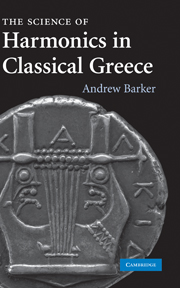Chapter 1 - Beginnings, and the problem of measurement
Published online by Cambridge University Press: 22 September 2009
Summary
The arrangement of this book is only partly chronological, as I have said. Still, one would like to begin at the beginning. But it is hard to know what would count as a solid historical starting point. New intellectual enterprises do not spring into being in a single bound, fully armed and fully recognisable; typically they trickle together as a confluence of tributaries which are themselves side-shoots of other, pre-existing traditions of thought, none of which ‘is’ this new thing, but whose developing combination can be seen, in retrospect, gradually to have become it. In any case, such information as we have about the earliest explorations of territory eventually claimed by this science is vague, unreliable and hopelessly entangled with legends and misconceptions that grew up in later times. Pythagoras, of course, is often identified as the fountain-head, and if that were true it would take us back to the late sixth century. There are also reports that his younger contemporary, the poet and composer Lasus of Hermione, wrote the first ‘treatise’ (logos) about music, and allusions in two other writers seem to suggest that Lasus' work had some connection with issues in harmonics. But one of these latter references is too enigmatic to be interpreted safely; in the second, which hints at connections with Pythagorean speculations in acoustics, there is a serious gap in the surviving text, and we do not know precisely what the author was asserting.
- Type
- Chapter
- Information
- The Science of Harmonics in Classical Greece , pp. 19 - 30Publisher: Cambridge University PressPrint publication year: 2007



